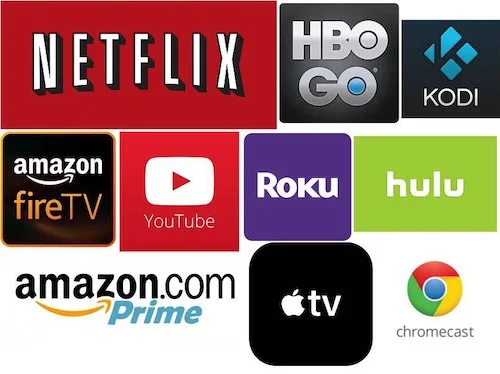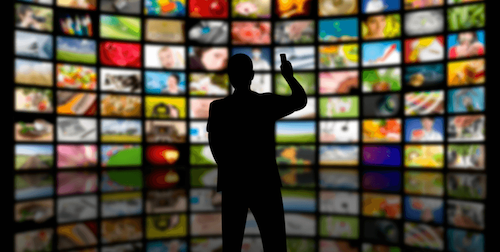Apple TV+, Plus What This All Means
The redundantly named Apple TV+ (as a means of seeming better than any other television or streaming service right off the bat) was just announced. To be fair, the idea of having a service that is a perfect marriage with your devices of choice (computer or phone; tablet, too) is a great idea. I am not a specs specialist, and will not go into the many reasons why this is a breakthrough (the many outlets covering this reveal will already get into that). As a film critic, I have a bigger question: are we on route to there being too many streaming services?
We have Netflix, Amazon Prime, Hulu, YouTube Red, Disney's incoming platform and more. Actually, let's not exclude the cinematic curatorial services like Mubi, Kanopy, Hollywood Suite and the late Fandor. Criterion is offering their own service next month. Different services provide different functions. Kanopy is linked to academic institutions, and can correlate with educational courses or events. Mubi functions like a cinematheque, and provides films only for a little while to entice you to view them before they are gone. Disney's platform will be a great hold on all of their cinematic and televised rights. Apple TV+ will take the actual viewing devices into account. Then there are the actual line ups, and each service has their own major list.
Services are also beginning to create their own content. Netflix has been making original series and films for around a decade now. Amazon Prime has been in the game for a short while now as well. This cements the home base for these works, as you have to have a membership to that particular service to view said film or series. There are also rights related partnerships, where a studio may be in cahoots with one provider and not the other.
Knowing all of this, is there a bit deal? Perhaps. Wasn't having too many avenues what has made physical releases struggle the last number of years? We have different formats that require different devices (and some of these devices are old, and the newer ones need fixes). You have many different stores, including ones that specialized in special releases (Best Buy exclusives were a notorious example). Online shopping also came into play. So many options. Streaming seemed like a much easier alternative, especially since it's cost effective (one price a month for all of these films?), and easier (all you need is the internet) for the common consumer. Online shopping seems to have won the physical distribution battle, seeing that major retailers that dabbled only in films and music (like HMV) are verging on extinction, and major electronic based retailers (Best Buy) are thinning their entertainment release sections.
During the start of this shifting tide, we mainly had Netflix: the one hotspot that had it all. Netflix was a DVD rental company that adapted to survive; it ended up changing the entire game. Years later, rights have come and gone. You may notice that Netflix's selection of unoriginal content is kind of lacking nowadays. It may be doing well with the content it creates, but many of your favourite shows and films have gone elsewhere.
Part of this success Netflix had, was being seen as an alternative for piracy. It wasn't so bad paying a set fee once a month to enjoy digital content (which is what you were going to download in a likely worse quality anyways). It was a bullet many were willing to swallow, and it made the fear of being caught with illegal torrents disappear (especially during the flashes of crack-downs on pirates).
Now, we have families annoyed that they have to wait for the Disney service to finally come out for the shows the children watched. We have people who relied on one service that held their favourite serials, and now they have to sign up elsewhere. We have students graduating that cannot access Kanopy and have to drive to a metropolitan library to gain access once again. The convenience is being stripped away. The inclusion of new contestants in this game has made the fight for rights intolerable for consumers. The problem with ditching the physical medium is the loss of permanence. Sure, all formats deteriorate, but at least owning A New Hope on DVD will allow you to watch it as often as you want and whenever you want. You don't have to worry about Disney purchasing Lucasfilm. Piracy also allowed for more control, because you at least have the digital download somewhere. Legal digital downloads are also an option, but that seems to be the less-used option when it comes to digital formats (usually if you want a copy of a film, you'll want an actual physical copy).
Will Apple TV+ only make this situation more difficult, or will it actually break ground? Pairing up your devices and allowing your favourite programs to work vicariously through your appliances is an innovation for sure. Apple has announced that they will be releasing original content, and thus they will be a part of that game, too. What we might need is a media form that will put everything back into check. A revival of home formats stores (many of us still love purchasing discs). Some new concept that will blow every streaming service out of the water (if I knew what it was, I'd be working on that instead of writing articles). Maybe Apple TV+, with its slight variation of the hottest model out there, could be that answer. All I know is that streaming has become a bit of a mess, and all parties maybe shouldn't have hopped into the ring so quickly.
Andreas Babiolakis has a Masters degree in Film and Photography Preservation and Collections management from Ryerson University, as well as a Bachelors degree in Cinema Studies from York University. His favourite times of year are the Criterion Collection flash sales and the annual Toronto International Film Festival.




